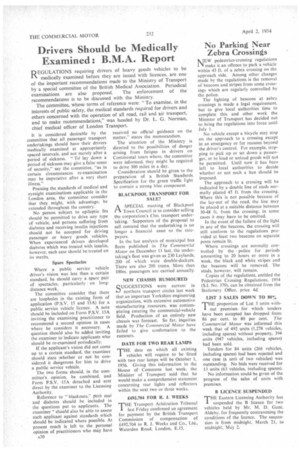Drivers Should be Medically. Examined : B.M.A. Report
Page 32

If you've noticed an error in this article please click here to report it so we can fix it.
REGULATIONS requiring drivers of heavy goods vehicles to be medically examined before they are issued with licences, are one of the important recommendations made to the Ministry of Transport by a special committee of the British Medical Association. Periodical examinations are also proposed. The enforcement of the recommendations is to be discussed with the Ministry.
The committee, whose terms of reference were: " To examine, in the interests of public safety, the medical standards required for drivers and others concerned with the operation of all road, rail and air transport, and to make recommendations," was headed by Dr. L. G. Norman, chief medical officer of London Transport.
It is considered desirable by the committee that all passenger transport undertakings should have their drivers medically examined at appropriately spaced intervals, and not merely after a period of sickness. "Ta lay down a period of sickness may give a false sense of security," say the committee, "as in certain circumstances re-examination may be imperative after a very short illness."
Praising the standards of medical and eyesight examinations applicable in the London area, the committee consider that they might, with advantage, be extended throughout the country.
No person subject to epileptic fits should be permitted to drive any type of vehicle, and persons suffering from diabetes and receiving insulin injections should not be accepted for driving passenger or heavy goods vehicles. When experienced drivers developed diabetes which was treated with insulin, however, each case should be treated on its merits.
Spare Spectacles
Where a public service vehicle driver's vision was less than a certain standard, he should carry a spare pair of spectacles, particularly on longdistance work.
The committee consider that there are loopholes in the existing form of application (P.S.V. 15 and 15A) for a public service vehicle licence. A note should be included on Form P.S.V. 15A inviting the examining practitioner to recommend a second opinion in cases where he considers it necessary. A question should also be added inviting the examiner to indicate applicants who should be re-examined periodically.
If the applicant's vision did not come up to a certain standard, the examiner should state whether or not he considered it dangerous for him to drive a public service vehicle.
The two forms should, in the committee's opinion, be combined. and Form P.S.V. 15A detached and sent direct by the examiner to the Licensing Authority.
Reference to "blackouts." petit mat and diabetes should be included in the questions put to applicants. The examiner "should also be able to assess each applicant against standards which should be indicated where possible. At present much is left to the personal opinion of practitioners who may have
A30 received no official guidance on the matter," states the memorandum.
The attention of the Ministry is directed to the possibilities of danger arising from fatigue in drivers on Continental tours where, the committee were informed, they might be required to drive 300 miles in a day.
Consideration should be given to the preparation of a British Standards Specification for the green traffic light to contain a strong blue component.
BIACKPOOL TRANSPORT FOR SALE?
(A
A SPECIAL meeting of Blackpool
Town Council is to consider selling the corporation's £3m. transport undertaking. Supporters of the proposal to sell contend that the undertaking is no longer a financial asset to the ratepayers.
In the last analysis of municipal bus fleets published in The Commercial Motor on December 11 last, the undertaking's fleet was given as 230 Leylands, 200 of which were double-deckers. There are also 200 trams. More than 100m. passengers are carried annually.
NEW CHASSIS RUMOURED
QUGGESTIONS were current in northern transport circles last week that an important Yorkshire engineering organization, with extensive automotive -manufacturing resources, was contemplating entering the commercial-vehicle field. Production of an entirely new chassis was forecast. So far, inquiries made by The Commercial Motor have failed to give confirmation to the rumours.
DATE FOR TWO REAR LAMPS
THE date on which all existing
vehicles will require to be fitted with two rear lamps will be October 1, 1956. Giving this information in the House of Commons last week, the Minister of Transport said that he would make a comprehensive statement concerning rear lights and reflectors within the next two or three weeks.
£492,704 FOR R. J. WEEKS
THE Transport Arbitration Tribunal last Friday confirmed an agreement for payment by the British Transport Commission of compensation of £492,704 to R. J. Weeks and Co., Ltd., Waterden Road, London, E.15.








































































































